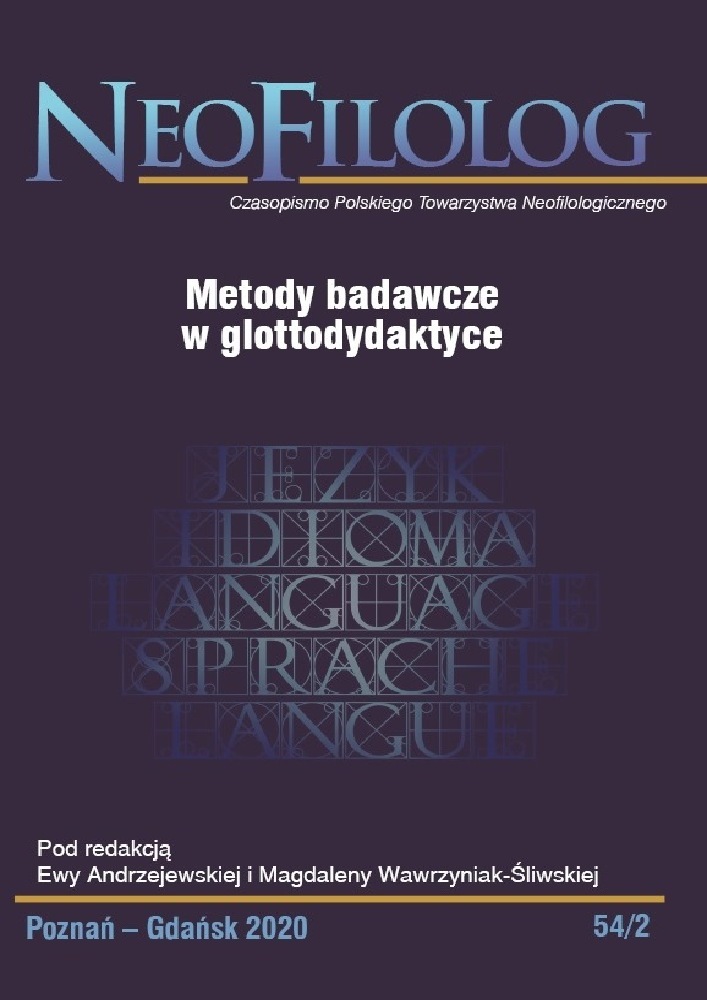Abstract
The aim of this paper is to evaluate implicit and explicit knowledge among Polish speaking students studying French as a foreign language in the academic environment. In the first part, we discuss a timed grammaticality judgment test (TGJT) as an instrument for measuring implicit knowledge and an untimed grammaticality judgment test (UGJT) as a tool for evaluating explicit knowledge and we propose solutions to sidestep some of the weaknesses of both these instruments which were observed in our research. The second part focuses on the presentation of the research results, leading to the conclusion that the group of students at A2 level develop implicit and explicit knowledge in a fairly balanced way
Literaturhinweise
Bajrić S. (2005), Question d’intuition. Langue française No 147, p. 7-18. Online : http://www.persee.fr/doc/lfr_0023-8368_2005_num_147_1_6860 [accès : 20.05.2020].
Barth B.-M. (2002), Le savoir en construction. Paris : Retz.
Burston M. (2008), Évaluer la compétence par un test de jugement de grammaticalité : le cas de la relativisation chez des apprenants chypriotes hellénophones avancés en FLE, in : Durand J. Habert B., Laks B. (réd.), Collection des Congrès Mondiaux de Linguistique Française, Paris, France 2008, 1791-1803. Online : https://www.researchgate.net/publication/45069247_Evaluer_la_competence_par_un_test_de_jugement_de_grammaticalite_le_cas_de_la_relativisation_chez_des_apprenants_chypriotes_hellenophones_avances_en_FLE [accès : 09.11.2019].
Chomsky, Noam. (1965). Aspects of the Theory of Syntax. Cambridge : Massachusetts : MIT Press.
Cuq J.-P. (réd.) (2003), Dictionnaire de didactique du français langue étrangère et seconde. Paris : Cle International.
Derkx V. (2015), L’intuition en sciences du langage : de l’énonciation à la grammaticalité des énoncés. Thèse de doctorat en linguistique non publiée. Paris.
Dubois J. (réd.), (2012), Dictionnaire de linguistique et des sciences du langage. Paris : Larousse.
Gombert J.E., Gaux, Ch., Demont, E. (1994), Capacités métalinguistiques et lecture, quels liens ? (in) Repères. Recherches en didactique du français langue maternelle nr 9, p.61-73. Online : https://www.persee.fr/doc/reper_1157-1330_1994_num_9_1_2111 [accès: 09.11.2019].
DeKeyser R.M. (2005), Implicit and explicit learning (in) : C.J. Doughty, M.H. Long (réd.), The Handbook of Second Language Acquisition. Oxford : Blackwell, p. 313-348.
Elder C. (2009), Validating a Test of Metalinguistic Knowledge (in) R. Ellis, S. Loewen, C. Elder, R. Erlam, J. Philp & H. Reinders (réd.), Implicit and Explicit Learning, Knowledge and Instruction. Bristol: Multilingual Matters, p.113-138.
Ellis, R. (2009), Implicit and Explicit Learning, Knowledge and Instruction (in) R. Ellis, S. Loewen, C. Elder, R. Erlam, J. Philp & H. Reinders (réd.), Implicit and Explicit Learning, Knowledge and Instruction. Bristol: Multilingual Matters, p. 3-25.
Han Y. (2000), Grammaticality judgment tests: How reliable and valid are they ? (in) ,,Applied Langauge Learning” nr 11(1), p. 177-204.
Kim M. (2010), The effects of storytelling on adults English language learners (in) ,,Linguistic Research” nr 27 (3), p. 447-473.
Loewen C. (2009), Grammaticality Judgment Test and the Measurement of Implicit and Explicit L2 Knowledge (in) R. Ellis, S. Loewen, C. Elder, R. Erlam, J. Philp & H. Reinders (réd.), Implicit and Explicit Learning, Knowledge and Instruction. Bristol : Multilingual Matters, p. 94-112.
Nadeau M., Fisher C. (2011). Les connaissances implicites et explicites en grammaire : quelle importance pour l’enseignement ? Quelles conséquences ? (in) ,,Bellaterra Journal of Teaching & Learning Language & Literature” Vol. 4 (4), p.1-31. Online : https://www.researchgate.net/publication/277225020_Les_connaissances_implicites_et_explicites_en_grammaire_quelle_importance_pour_l'enseignement_Quelles_consequences [accès: 09.11.2019].
Piegzik W. (2019), La construction des connaissances implicites et explicites en langue étrangère : vers un développement harmonieux ou déséquilibré ? Cas des étudiants polonophones étudiants en FLE développant le plurilinguisme (in) : M. C. Ainciburu (réd.), En camino hacia el plurilingüismo. Actos del IV Congreso Internacional Nebrija en Linqűística Aplicada a la Enseñanza de Lenguas, Madrid : Universidad Nebrija,163-174. Online :
https://www.nebrija.com/vida_universitaria/servicios/pdfpublicaciones/ActasIVCongresoSLANebrija.pdf [accès: 09.01.2020].
Polański K. (red.) (2003), Encyklopedia językoznawstwa ogólnego, Wrocław: Ossolineum.
Tardif J. (1992), Pour un enseignement stratégique : apport de la psychologie cognitive. Montréal : Les Éditions Logiques.
Wilczyńska W., Michońska-Stadnik A. (2010), Metodologia badań w glottodydaktyce. Wprowadzenie. Kraków: Avalon.
Yaguello M. (1988), Catalogue des idées reçues sur la langue. Paris : Éditions du Seuil.
Lizenz
Copyright (c) 2020 Neofilolog

Dieses Werk steht unter der Lizenz Creative Commons Namensnennung - Keine Bearbeitungen 4.0 International.
Autoren:
Die Autoren der zur Veröffentlichung in der Zeitschrift Neofilolog angenommenen Texte sind verpflichtet, den Vertrag über die Erteilung einer kostenlosen Lizenz für die Werke mit der Verpflichtung zur Erteilung einer Sublizenz CC auszufüllen, zu unterzeichnen und an die Adresse der Redaktion zurückzusenden.
Gemäß Vertrag erteilen die Autoren auf die in der Zeitschrift Neofilolog veröffentlichten Texte der Adam-Mickiewicz-Universität in Poznań eine nicht exklusive und kostenlose Lizenz und erlauben die Verwendung der Sublizenz Creative Commons Attribution-NoDerivatives 4.0 International (CC BY-ND 4.0).
Die Autoren behalten das Recht zur weiteren freien Verfügung über das Werk.
Benutzer:
Interessierte Onlinebenutzer dürfen die seit 2017 veröffentlichten Werke unter folgenden Bedingungen nutzen:
- Anerkennung der Urheberschaft - die Verpflichtung, zusammen mit dem verbreiteten Werk Informationen über die Urheberschaft, den Titel, die Quelle (Links zum Originalwerk, DOI) und die Lizenz selbst bereitzustellen;
- ohne Schaffung abgeleiteter Werke - das Werk muss in seiner ursprünglichen Form erhalten bleiben, ohne Zustimmung des Autors dürfen keine Studien, beispielsweise Übersetzungen, verbreitet werden.
Die Urheberrechte aller veröffentlichen Texte sind vorbehalten.
Sonstige:
Die Adam-Mickiewicz-Universität in Poznań behält das Recht auf die Zeitschrift als Gesamtheit (Layout, Grafik, Titel, Umschlagsprojekt, Logo usw.).

